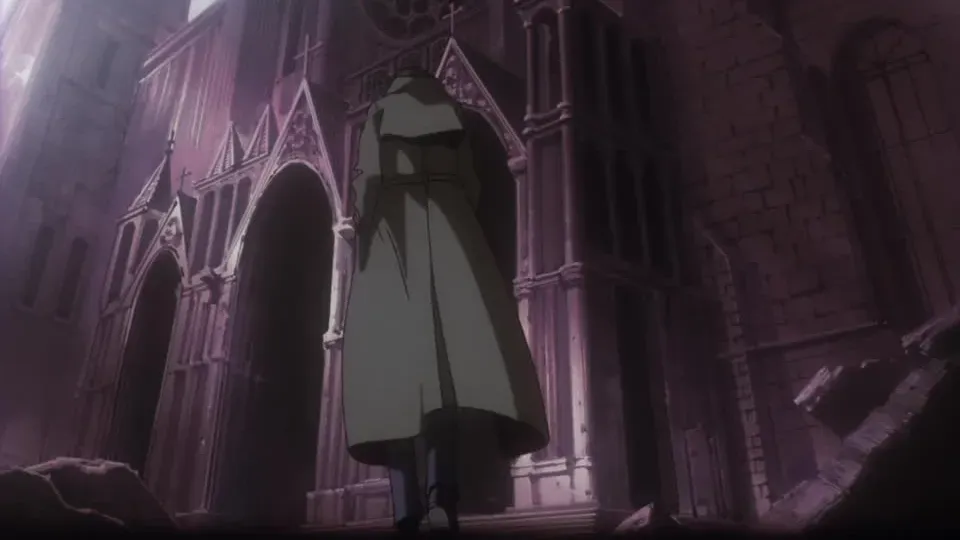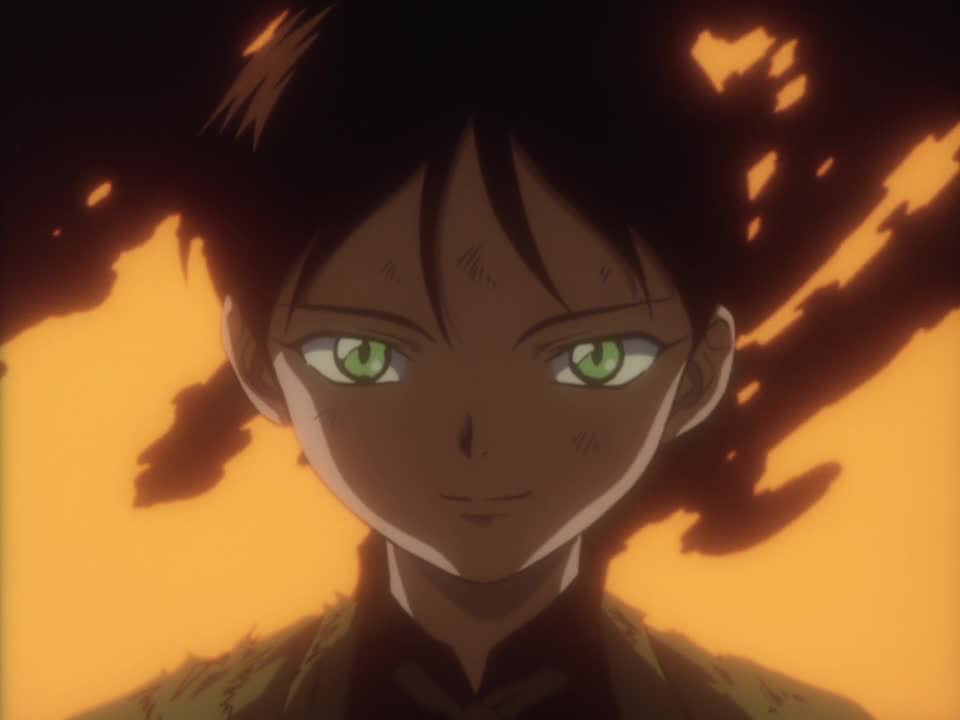Cowboy Bebop: "Ballad of Fallen Angels" and "Sympathy for the Devil"
In which I have no idea what's going on, but I love that for me

(This is the first installment of my biweekly recaps of Cowboy Bebop, the TV Tokyo animated series that ran from 1998 to 1999 to cult fascination and critical acclaim. I’ve never seen it! These recaps are only available to paid subscribers.)
- “Ballad of Fallen Angels” (originally aired November 21, 1998 [Wowow] and September 24, 2001 [Adult Swim])
- “Sympathy for the Devil” (originally aired November 28, 1998 [Wowow] and December 17, 2001 [Adult Swim])

One of my favorite sensations when watching a movie or TV show is having no idea what's going on. I've told this story a few times, so I'm sorry if you've heard it before. But the first episode of Buffy that I ever saw was "Innocence," the second half of a famous two-parter that redefined the show and unveiled a plot twist so massive it's still justifiably famous.
I had no idea what was going on; I loved being so confused. I immediately hopped online to research everything I could about this weird new show I had stumbled upon.
My experience of watching Cowboy Bebop isn't exactly the same as hopping into a show in its 26th episode, being incredibly discombobulated, and deciding to ride or die for that show forevermore. But it exists in an area where lots of TV shows with adoring fandoms exist in now: I have heard so much about this show at this point that I feel like I've wandered into a series everybody else has been watching for several years now. In terms of Cowboy Bebop, I am consuming the story in exactly the way the team Hajime Yatete intended it to be consumed. In terms of the general discussion around this show, however, I feel like I'm playing catch-up.
This disconnect leads to how I feel about these two episodes, which I loved. "Ballad of Fallen Angels" is as sleek and stylish a TV noir as I've ever seen, and "Sympathy for the Devil" is weird, weighty, and wacky all at once. These two episodes more or less got me completely on board for whatever Bebop might have awaiting me in future episodes.
But I also feel like I still have no idea what's going on. A lot of that feeling is intentional on the part of the creators. But at least some of it stems from the significant footprint this series has left in the pop culture imagination.
Strictly speaking, "Fallen Angels" is a bit of an exposition dump, albeit one that shows far more than it tells. We get Spike's tragic back story, more or less, and we meet Vicious, a member of the Red Dragon crime syndicate who is Spike's former partner. If I know television (and I do), I am willing to bet that Vicious is going to be one of the series' two or three main antagonists, if only because his personal history with Spike provides rich seeds for character conflict. (The two were in love with the same woman. Gasp!)
But "Fallen Angels" is so much more than an opportunity to give viewers lots of lore. In particular, I love what it does for the character of Faye, who goes after the Mao bounty on her own, then finds herself wrapped up in the middle of this ancient feud that Spike and Vicious have been nursing all along. And even though she ends up captured (which has happened in all three episodes she's been in so far?), that Spike goes after her indicates the degree to which she's already becoming a vital member of the crew.
What's more, I love how swiftly the episode sets up a villain status quo, with Mao at the head of this vast crime syndicate, then immediately undercuts it by having Vicious kill Mao. A lot of modern TV shows would waste so much time on setting up Mao and making him seem indestructible before having Vicious kill him. That approach can certainly work, but I tend to appreciate the approach taken here, which leaves you feeling shaky and uncertain. By the time "Fallen Angels" reaches its five-minute mark, you're not entirely sure what show you're watching anymore, even as it hasn't changed anything that radically.
Most great TV shows have an episode like "Fallen Angels" somewhere in the episode four/five/six slot. These episodes tend to reinvent the show's status quo, while also subtly reasserting it, and they often deepen the stakes for the characters and their emotional arcs. "College," the famous Sopranos episode where Tony kills the mob informant while taking Meadow on a college visit, is probably the most famous example of such an episode, but if you have a favorite TV show, I'm willing to bet it has its own version of that type of episode.
I don't yet know where Cowboy Bebop is going entirely (though after six episodes, I know it will look and sound cool as hell getting there), but I'd be pretty surprised if I don't reach the end of the series and find that "Fallen Angels" pointed the way to where everything was headed.
ALSO LIKE THAT WHOLE FIGHT IN THE CATHEDRAL AND THEN THE WEIRD MONTAGE AS SPIKE FALLS BACK TO THE GROUND??? And then he's remembering when his ex cared for him after he was injured, only to wake up and realize that the person who's humming while he recuperates is Faye? I think I'm on team Spike/Faye now. Sorry, Spice/Vicious fans!
What I'm saying is "Ballad of Fallen Angels" rules, and even if I hated the rest of this show, I would be so glad I saw it.

Fortunately, I don't hate the rest of the show! "Sympathy for the Devil" isn't quite as good as "Fallen Angels," but it's probably my favorite of the "standalone bounty" episodes so far. I love that the villain is basically just Kirsten Dunst's character from Interview with the Vampire, this terrifying, bloodthirsty creature who looks like a child, and the closing bit where Spike shoots him dead between the eyes is perfectly dark and unsettling. Yeah, we know that this kid isn't a kid at all, but you still have to contend with the visuals of the show's hero shooting what appears to be a kid. It's not hard to imagine someone stumbling upon this while channel surfing and wondering what the fuck this show was on about.
Indeed, when it aired the series, Adult Swim aired "Sympathy for the Devil" way out of order, and while the show's airing on US television was greatly impacted by the Sept. 11 terrorist attacks, it's not hard to imagine how some of the content in this show would have made notoriously skittish American censors just a bit squeamish. Yet within the context of fall 2001 in the US, the fact that "Sympathy" features a child emerging from the rubble of a collapsed building... you can see why the network delayed the episode by several months.
On shows with episodic storytelling structures, I tend to think the episodes work best when they are either illuminating new aspects of a particular character or reiterating aspects you might have forgotten about. On this level, then, "Sympathy" is a success because it further underlines how little Spike seems to care if he lives or dies and because it shows us even greater lengths he's willing to go to in order to keep rolling forward. These qualities are particularly useful to examine in the wake of "Fallen Angels," because they now have a new context placed around them.
Also: We learn that Faye will eat dog food and taunt a dog while she's doing it, which is valuable information to have.
If there's one thing that I'm not quite vibing with in the show at this point, it's the sci-fi world building, which feels more pastiche-y than I normally like. The technobabble reasoning for just why Wen hasn't aged took up too much time in a story that was already a bit too complicated for its running time. What's more, the world building is simultaneously a little too simple (most of the basic ideas here are well within the typical bonds of the subgenre) and monstrously too complex (I'm still piecing together shit like the Astral Gate Incident). It's a minor quibble in the scope of things on a show I'm really enjoying, but I hope this all settles down sooner or later.
All in all, were I someone watching this show live in 2001, these two episodes would have convinced me I had found a show I would follow to the ends of the Earth. And then maybe I would have been bothering you to watch it, instead of the reverse. Now, allow me to say that I still don't quite know what's going on, but I'm enjoying the hell out of being confused.

Other thoughts I thought:
- Look, I gotta say it: Vicious is straight-up hot. I'm going to marry him. I hope that we're all okay with this plan.
- I like that Faye having a love/hate relationship with everybody in the cast extends to Ein. I hope these two find a way to work out their differences and play some great games of fetch.
- I have to say that Spike pretend shooting Wen's harmonica with his finger gun as a way to end an episode is pretty incredible. One thing I love about this show is that I can never guess where the creators' creative impulses are going to take me. I love that feeling.
- I love the "next week on" bits at the end of every episode. The one at the end of "Sympathy for the Devil," where Spike and Faye are trying to yell over the loud heavy metal music, is so clever.
- I know I already freaked out about this above, but that cathedral sequence in "Fallen Angels" is so fucking cool. I kind of want to live in its gothic maximalism forever and ever.
Next time: I'll see you in two weeks when we cover "Heavy Metal Woman" (we'll have to yell very loudly, evidently) and "Waltz for Venus," which sounds... ahem... heavenly. See you then!



